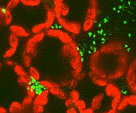Plant Pathology, Department of

Department of Plant Pathology: Faculty Publications
Document Type
Article
Date of this Version
2004
Abstract
The discovery of Meloidogyne mayaguensis is confirmed in Florida; this is the first report for the continental United States. Meloidogyne mayaguensis is a virulent species that can reproduce on host cultivars bred for nematode resistance. The perineal patterns of M. mayaguensis isolates from Florida show morphological variability and often are similar to M. incognita. Useful morphological characters for the separation of M. mayaguensis from M. incognita from Florida are the male stylet length values (smaller for M. mayaguensis than M. incognita) and J2 tail length values (greater for M. mayaguensis than M. incognita). Meloidogyne mayaguensis values for these characters overlap with those of M. arenaria and M. javanica from Florida. Enzyme analyses of Florida M. mayaguensis isolates show two major bands (VS1-S1 phenotype) of esterase activity, and one strong malate dehydrogenase band (Rm 1.4) plus two additional weak bands that migrated close together. Their detection requires larger amounts of homogenates from several females. Amplification of two separate regions of mitochondrial DNA resulted in products of a unique size. PCR primers embedded in the COII and 16S genes produced a product size of 705 bp, and amplification of the 63-bp repeat region resulted in a single product of 322 bp. Nucleotide sequence comparison of these mitochondrial products together with sequence from 18S rDNA and ITS1 from the nuclear genome were nearly identical with the corresponding regions from a M. mayaguensis isolate from Mayaguez, Puerto Rico, the type locality of the species. Meloidogyne mayaguensis reproduced on cotton, pepper, tobacco, and watermelon but not on peanut. Preliminary results indicate the M. mayaguensis isolates from Florida can reproduce on tomato containing the Mi gene. Molecular techniques for the identification of M. mayaguensis will be particularly useful in cases of M. mayaguensis populations mixed with M. arenaria, M. incognita, and M. javanica, which are the most economically important root-knot nematode species in Florida, and especially when low (<25) numbers of specimens of these species are recovered from the soil.


Comments
Published in Journal of Nematology (2004) 36(3):232–240; © The Society of Nematologists 2004; Used by Permission